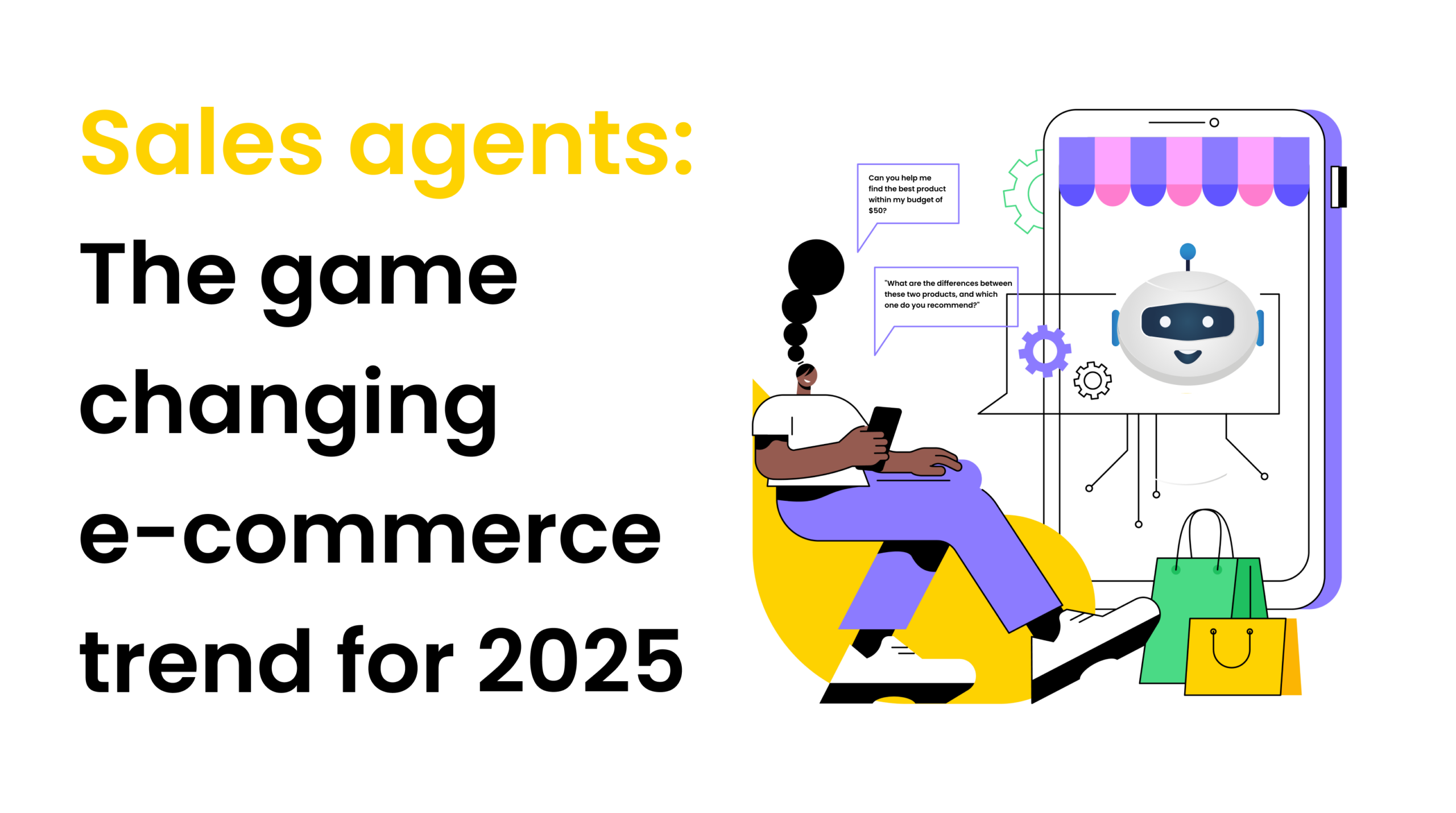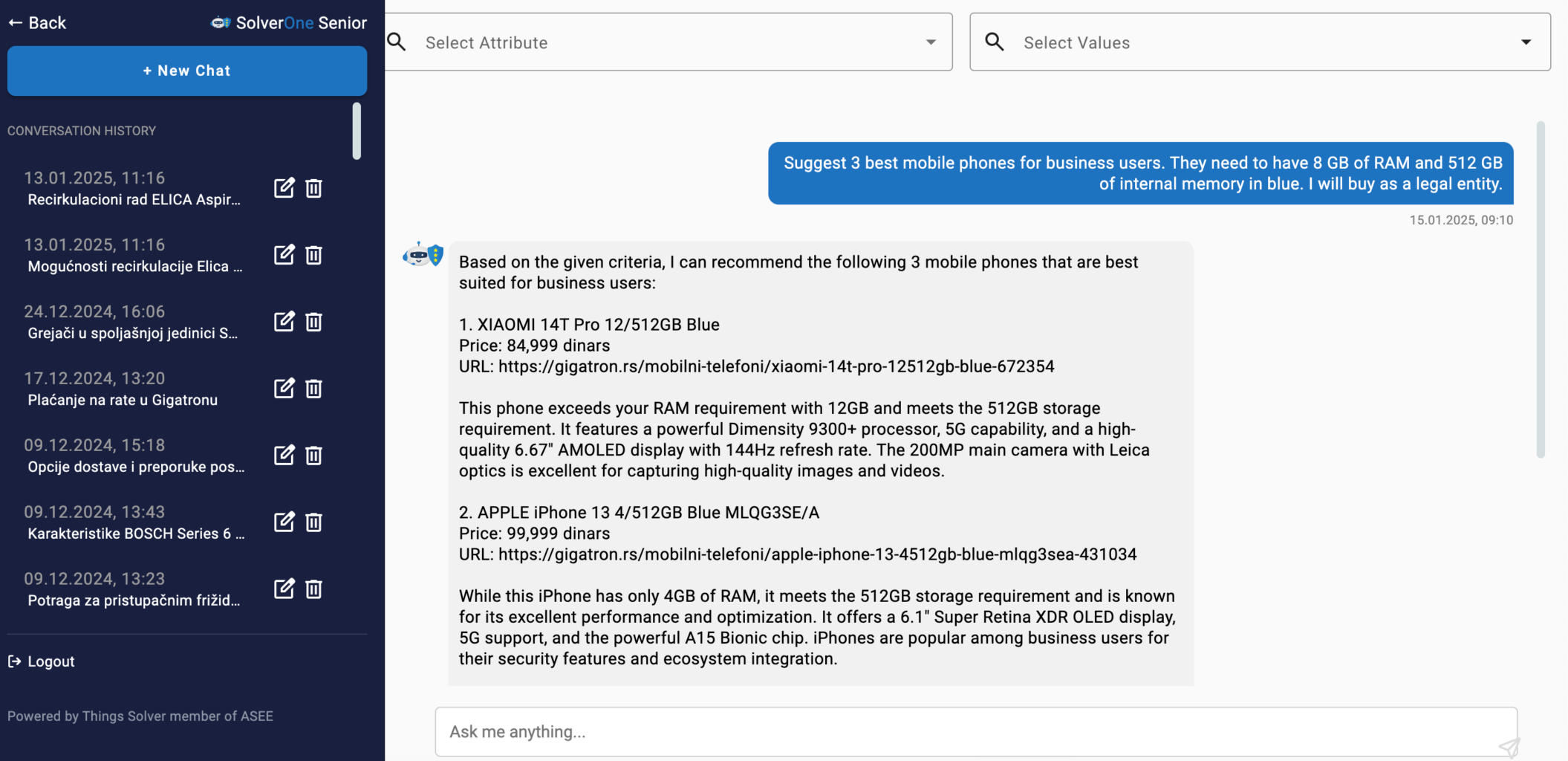The real work starts after Black Friday: Year-round customer retention strategies
In the rush to prepare for Black Friday, businesses often focus on attracting as many new customers as possible. With…
Read moreAnja Bojic | 15. 01. 2025.

E-commerce is a space that is continuously in development, driven by ever-improving AI that allows for even more sophisticated and personalized customer experiences.
Beyond this wave is a rise: agentic AI, a new frontier in technology that enables sales agents to make contextual recommendations and engage in human-like interactions. This trend brings further growth in popularity with conversational AI, such as ChatGPT, and continues to manifest in increased adoption of contextual search that makes online shopping more intuitive.
Today, customers want speed and intuitiveness in their shopping experience above anything else. Sales agents meet these expectations and change the way businesses interact with their audiences, setting a new benchmark for online shopping.
In this blog post, we’ll explore how agentic AI changes this landscape by enabling sales agents to make contextual recommendations, interact in a human-like manner, and improve customer satisfaction while driving sales.
Agentic AI is a form of artificial intelligence involving autonomous, real-time interaction, which enhances human decision-making.
Unlike traditional AI, which involves massive human intervention, Agentic AI is capable of making decisions independently and acting upon dynamic data inputs.
While agentic AI solutions can support various industries like healthcare and finance by helping diagnostics and predicting market trends, in e-commerce, its role is particularly transformative when paired with sales agents.
These AI-powered sales agents deliver highly personalized customer experiences by understanding user preferences and behaviors. They can:
Let’s see how this works in practice.
Agentic AI operates as a step-by-step process designed to ensure the best online shopping experience. We can highlight 4 different steps:
At this initial stage, Agentic AI picks up data from various touchpoints that a customer gets in contact with, including interactions via websites, previous purchases, and browsing history. The data helps to derive an understanding of customer preferences and requirements.
Agentic AI applies advanced algorithms to analyze the data collected, predict what customers may want next, and then create personalized recommendations. Techniques such as retrieval-augmented generation ensure these suggestions are accurate and relevant.
The integration with e-commerce via APIs allows Agentic AI to execute personalized product recommendations, update inventory, and respond to customer queries in real time.
Agentic AI improves its performance by learning from customer interactions and developing its models over time. This continuous learning cycle enhances the system’s effectiveness in aligning with the evolution of customers’ preferences.
This structured approach helps in tailoring every interaction to the needs of the customer, hence making the shopping journey more engaging and efficient.
Overall, the biggest benefit of agentic AI and the use of sales agents is revolutionizing the online shopping experience, making it even quicker, more intuitive, and hyper-personalized.
But let’s see what other benefits you can enjoy by implementing agentic AI solutions in your e-commerce business in 2025.
Agentic AI in e-commerce is on the rise, making the online shopping experience faster, more intuitive, and hyper-personalized. By far, one of the biggest advantages is an improvement in customer service, whereby AI agents can assure 24/7 availability and faster response times.
Unlike traditional customer service models, these sales agents instantly recognize customer needs and offer them relevant solutions, further enhancing their satisfaction.
Other advantages are in offering personalized shopping experiences. Using the customer data at hand, agentic AI can give recommendations that are not only very accurate but also highly personalized to fit each customer’s preference and behavior.
This ensures customers receive suggestions with regard to their needs, just as an informed salesperson would do for them in a physical store.
Additionally, agentic AI can drive a lot of efficiencies and cost savings. It smoothes out operations and lessens the requirement for big support teams, at the same time as it ascertains speeding up search processes and showing results in real-time.
For example, if he types “black sneakers under $100,” this AI-driven sales agent will, within seconds, filter through available products to give immediate results relevant to his query, thus easing the customer’s shopping experience more.
Put together, these benefits can result in more conversions and sales because customers will likely complete their purchases once they receive timely, personalized assistance. In enabling targeted upselling and cross-selling, agentic AI drives revenue and is a game-changer for e-commerce in 2025.
Sales agents use advanced AI models, including NLP (Natural Language Processing), to understand customer inquiries and respond in a natural, conversational manner.
They are also able to respond to complex or very specific questions by interpreting user intent through NLP, thus allowing for an intuitive experience.
This conversational ability is enhanced by machine learning algorithms that analyze customer data, including:
For instance, if a user searches for “black dress,” the sales agent can immediately suggest options tailored to their preferences in terms of brand, material, or price. It may also propose additional items that go along with black dresses or those that are currently trending.
Real-time data is integral to refining such interactions. The continuous analysis of user behavior during the session makes the assistant change recommendations to make the experience personalized, almost like shopping with a knowledgeable sales associate.
Conversational AI, popularized by tools like ChatGPT, has fundamentally reshaped customer expectations and set a new bar for natural, intuitive, and dynamic interactions.
This shift gave way to a powerful trend: contextual search. It means enabling e-commerce platforms to deliver faster, more personalized results by understanding not just what customers ask for but the intent behind their queries.
To epitomize contextual AI in action, businesses need an innovative tool, something like Things Solver‘s sales agent. The main idea behind our tool is to streamline online shopping experiences, making it more intuitive and customer-centric.

Our sales agent is an easy, user-friendly bot located at the bottom right corner of your website. Your shoppers can turn it on and off with one click.
Moreover, our sales agent is designed to:
When we created our own sales agent, we wanted to create an AI tool that would enhance your customers’ journeys and simplify the entire process for them. Of course, you won’t mind enjoying increased customer satisfaction and better sales that come with it.
The integration of agentic AI and AI-powered sales agents gives businesses a serious competitive advantage, saving hours with:
Most importantly, AI-powered sales agents can help increase customer loyalty by creating personalized, consistent, and intuitive shopping experiences. Convenience and personalization are what most drive consumers in today’s fast-paced digital landscape.
Sales agents will be even more intuitive and powerful as AI technology progresses and more innovative AI strategies appear.
What awaits us in the near future?
With AI technology, we will be able to introduce voice-powered interactions in which users may select products or receive recommendations through simple voice commands for an even more natural, hands-free shopping experience.
Another way of integration will introduce radical changes to personalization: soon, customers will be able to upload a photo and then let the sales agent suggest products that perfectly suit their taste and preferences.
Looking ahead, predictive insights will take personalization a notch further, where the sales agents will anticipate customer needs by relying both on historical and real-time data. These innovations will turn e-commerce into an integrated and highly personalized journey.
AI-powered sales agents are not a trend, but the future of e-commerce.
By offering customized, efficient, and intuitive shopping experiences, they can turn upside down how you communicate and interact with your customers. Our innovative sales agent is designed to help your business stay ahead of the curve by enhancing customer satisfaction and driving sales.
Ready to see how sales agents work in practice?
Reach out to us to at ai@thingsolver.com or book a demo to be among the first to try Things Solver’s sales agent and see how it can revolutionize your e-commerce business. Let’s shape the future of online shopping together!
In the rush to prepare for Black Friday, businesses often focus on attracting as many new customers as possible. With…
Read moreBlack Friday is one of the greatest shopping events of the year. It is a perfect opportunity for businesses to…
Read moreWant to turn curious browsers into loyal customers? Crafting a rock-solid customer acquisition strategy might be the secret sauce to…
Read more